|
RINGGOLD COUNTY in the CIVIL WAR

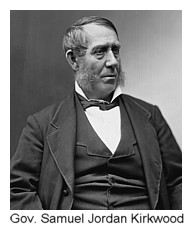
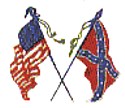 PLEASANT PLAINS, IOWA
PLEASANT PLAINS, IOWA
July 28, 1861
Governor S. J. KIRKWOOD:
DEAR SIR: Since my dispatch to you, dated Leon, July 23 [1861], communicating a general account of the recent troubles
on the border of Ringgold County, I have the honor to report to you further troubles, with my action in the premises,
with the hope that it will meet your sanction.
On my return home from Leon, I was met by a messenger from Captain W. C. DRAKE, of Corydon, who was at that time
stationed at Allenville, on the border of Ringgold County, informing me that Colonel CRANOR, of Gentry County, Missouri,
had sent to him for assistance and re-enforcements, as the rebels were fortified on Grand River, reported to be from 800
to 1,200 strong, with three pieces of artillery. Colonel CRANOR had under his command about 300 Union Missouri men,
badly armed, and over 100 Iowans, who had volunteered under him. I dispatched a messenger from Garden Grove to the
various armed companies within reach, ordering them to march and concentrate at Allenville immediately, also at Chariton.
Communications were sent to Keokuk and Burlington for two pieces of artillery, to be forwarded to me, if they could be
obtained. I also sent a messenger to Captain DRAKE, to ascertain more minutely the facts as to the condition of affairs
in his vicinity. I started for Captain DRAKE'S camp, but was met 25 miles this side by the returning messengers, whom I
had sent the day before. These confirmed all the intelligence brought me the day previous.
On reaching Captain DRAKE'S camp I ascertained that messengers had just arrived from Colonel CRANOR'S command, conveying
the information that the belligerent, then within 4 miles of each other, had made a treaty of peace. I have seen a copy
of it, and it is in substance as follows: Each party was to lay down its arms, return home, and assist each other in
enforcing the laws of Missouri against all offenders. This was a decided victory gained by the rebels, as the terms were
general, and embraced the obnoxious "military bill" of that State, and such laws as the rebel legislature, then in
session in the southern part of the State of Missouri, might thereafter pass, under the auspices of Governor JACKSON.
Colonel CRANOR resides in the neighborhood of a large body of secessionists, and was no doubt influenced to enter into
such a treaty in consequence of intimidation and threats against his life and property. The secessionists in that region
are more bold than before, and have recommenced mustering under the military laws of the State, which are obnoxious to
the Union men, and to which they will not submit. The Union men of that region of the State are indignant and mortified
at the terms of the treaty. Many have become disheartened, have abandoned their property and their crops, and are leaving
the State. The same feelings have taken hold of many families on the border, in Iowa. I have seen several families who,
abandoning everything to the fates, have returned to friends in other States. The loyal men of both States, separated
merely by an imaginary line, have the same sympathies in a common cause. Whatever excitement is raised or demonstration
made in Missouri tending to injure the property and destroy the lives of Union men of that State appeals for aid to
friends and neighbors in Iowa; nor do they appeal in vain. The arming and military parades made by our companies along
the border at most points have produced most salutary effects; it strengthens and inspires the Union men of Missouri,
and carries over to them the neutrals and a great many terror-stricken secessionists. They voluntarily come forward
every day and take the oath of allegiance.
In connection with the subject of my last dispatch to you, I would say that at least 1,500 citizens of Iowa left their
harvest fields and families and rushed into Missouri to the relief of the Union men. These citizens were armed in every
conceivable manner, without officers, system, or drill. They generally traversed a country broken with timber and
undergrowth. Had the rebels displayed sufficient nerve and skill they might have killed and captured them all; or had a
general engagement taken place, our citizens, without officers, system, or drill, might have slaughtered each other.
The loyal men of Missouri express their gratitude to the people of Iowa for their timely aid and support on every trying
occasion. Everything they possessed was cheerfully offered free of charge to render our citizens as comfortable as
possible. I know several gentlemen who not only fed hundreds of Missouri citizens and their horses daily, for over a
week at a time, but spent hundreds of dollars, sometimes their last dollar, in this benevolent manner. On account of
the excitement and constant alarm along the border our citizens lost much valuable time by frequent hurrying to arms;
therefore a vast amount of grain was lost on the fields.
In view of apprehended outbreaks, sooner or later, on the border of Ringgold and Taylor Counties, I have ordered into
camp at this place those companies which have received marching orders and are already on the way to the scene of
difficulty. For the reasons before stated, coupled with the news of our late reverses at Manassas Junction, the rebels
here and elsewhere will be inspired with new vigor. I came into camp last night with three companiees; the rest will
follow to-day and to-morrow. I have commenced systematizing every department of the service, placing the most competent
men in the various positions; the strictest discipline will be adopted, and drill performed as in the United States
service. Every arrangement necessary for the comfort and health of the soldiers will be carried out. The most rigid
economy will be practiced, and an exact account rendered of every cent of expense incurred. The times are such that the
people demand that something be done at once and effectively. We are so situated on the border that when we are called
upon to act we must act at once. Heretofore we had no system; if called into action, our men were liable to be cut off
by the enemy and by one another. All the companies called
into camp are armed except the cavalry, decidedly the most effective on the border. For want of better, I shall arm them
with muskets as far as I can.
I have ordered into camp on the line between Taylor and Ringgold Counties two companies for thirty days, unless sooner
ordered to disband, as you may direct. I will keep out scouts for the next ten days in the vicinity where danger will be
most likely to occur. I will be ready to strike at a moment's notice. If I am convinced that matters are settled, I will
in less than two weeks strike camp.
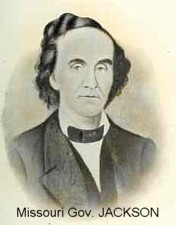 By that time I am of the opinion we shall be able to determine, with some degree of certainty, the shape things will
assume at the strong secession holds. There has been a settled understanding among the secessionists throughout Missouri
to strike a blow simultaneously with Governor [Claiborne Fox] JACKSON, who is operating in the southern portion of the State. I will
report to you as often as I can my proceedings.
By that time I am of the opinion we shall be able to determine, with some degree of certainty, the shape things will
assume at the strong secession holds. There has been a settled understanding among the secessionists throughout Missouri
to strike a blow simultaneously with Governor [Claiborne Fox] JACKSON, who is operating in the southern portion of the State. I will
report to you as often as I can my proceedings.
The principal design of the secessionists in the northern portion of the State is to keep up the excitement as much as
possible, to divert attention from JACKSON'S operations, while they will do all in their power to harass the Union men in
both States. They will not come to a regular engagement. In Gentry County [MO] alone they will number at least 1,000, who are
continually on the tramp, day and night, skulking in the bush.
We have derived a great deal of authentic information through our scouts, who have penetrated their camps and councils,
coming in upon them from the southeast and passing for secessionists.
The 300 muskets have just arrived.
I remain, very respectfully, your obedient servant,
John EDWARDS,
Lieutenant-Colonel and Aide-de-Camp

BRIGADIER-GENERAL JOHN EDWARDS
Eighteenth Iowa Infantry

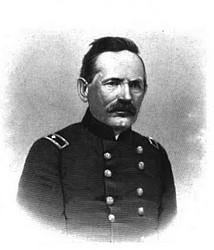
 John EDWARDS was born the 24th day of October, 1815, in Jefferson county, Kentucky, and lived with his parents at the old
homestead till he reached his eighteenth year. Leaving Kentucky at eighteen, he removed to Indiana, and settled in
Lawrence county; where, purchasing a form, he continued his residence till the year 1849. In Indiana he was highly
respected, and, during the last years of his residence there, was elected at different times to each branch of the State
Legislature.
John EDWARDS was born the 24th day of October, 1815, in Jefferson county, Kentucky, and lived with his parents at the old
homestead till he reached his eighteenth year. Leaving Kentucky at eighteen, he removed to Indiana, and settled in
Lawrence county; where, purchasing a form, he continued his residence till the year 1849. In Indiana he was highly
respected, and, during the last years of his residence there, was elected at different times to each branch of the State
Legislature.
In 1849, he sold his farm and emigrated to California. Settling in the Nevada District, he was, in 1851, elected by the
people to the Alcalde; for the State Government had not at that time been formed. After serving in that body for one year,
he returned to Indiana, and was again elected to the State Senate. In 1853, he came to Iowa and located in Chariton,
where, engaging in the practice of law, he has since resided.
In Iowa, General EDWARDS has been a prominent public man. In 1858, he was a member of the State Constitutional Convention;
and subsequently served three terms in the State Legislature. He was the representative from Chariton at the outbreak of
the war, and Speaker of the House. He was from the first a staunch war-man; and coming from the extreme southern part of
the State took a lively interest in preparing for the defense of our southern border, which was at that time being
threatened by the Missouri rebels. On the 9th of June, 1861, he was commissioned aid de camp to Governor KIRKWOOD, with
the rank of lieutenant-colonel of cavalry; and was the first man in the State promoted to that office. For several months
he had charge of a large portion of the border between Iowa and Missouri, during which time, he twice marched his troops
into Missouri — once as far south as the Hannibal and St. Joseph Railroad. Resigning his commission as aid de camp, June
20th, 1862, he was, on the 17th of July following, made colonel of the 18th Iowa Infantry. For his able and faithful
services in Missouri and Arkansas, he was, in the winter of 1864-5, promoted to a general officer; and I believe none will
say he did not richly earn his promotion.
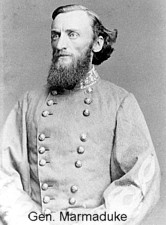 The history of the 18th Iowa Infantry while under the command of Colonel EDWARDS is as replete with interest as that of
almost any other Iowa regiment. It does not enjoy the reputation that many others have; and for the reason, I believe,
that the people are ignorant of its record. From the time it engaged and defeated the braggart
[General John Sappington] MARMADUKE, at Springfield
in January, 1863, to the time it fought Price and his subordinates on the Saline River, in the spring of 1864, its conduct
has, in every instance, been such as to elicit much praise from both its division and department commanders. Indeed, I
believe it would be unwilling to exchange either its number or its record with any regiment of the State; for, if others
have served with more distinction, they have not with greater honesty and fidelity.
The history of the 18th Iowa Infantry while under the command of Colonel EDWARDS is as replete with interest as that of
almost any other Iowa regiment. It does not enjoy the reputation that many others have; and for the reason, I believe,
that the people are ignorant of its record. From the time it engaged and defeated the braggart
[General John Sappington] MARMADUKE, at Springfield
in January, 1863, to the time it fought Price and his subordinates on the Saline River, in the spring of 1864, its conduct
has, in every instance, been such as to elicit much praise from both its division and department commanders. Indeed, I
believe it would be unwilling to exchange either its number or its record with any regiment of the State; for, if others
have served with more distinction, they have not with greater honesty and fidelity.
The first march of the 18th Iowa was from Sedalia, Missouri, to Springfield; its first campaign, from Springfield into
Northern Arkansas; and its first severe engagement, at Springfield, on the 8th of January, 1863.
In August, 1862, Colonel EDWARDS marched his command from Sedalia to Springfield, where he was organized in the Army of
the South West, at that time commanded by General SCHOFIELD. In the expedition to Cane Hill, amid other points in Northern
Arkansas, which soon followed, he took part, remaining with the main army till its return to Ozark, when, with his
regiment, he was given charge of the sick and prisoners, and sent back to Springfield. Arriving in the latter part of
November, 1862, he was, in the following December, detailed on a court-martial in St. Louis. Springfield remained the
head-quarters of the 18th Iowa from that time until October of the following year.
The battle of Springfield, as already stated, was the regiment's first engagement, and in premising, I quote briefly
from General MARMADUKE'S official report:
Head-Quarters, 4th Division, 1st Corps, T. M. D.
Batesville, Ark., January 18th, 1863
Colonel:
In obedience to instructions from General HINDMAN, I marched from Lewisburg, Arkansas, December 31, 1862, via
Yellville, Arkansas, to strike the enemy in rear and flank, with sixteen hundred men under SHELBY, and two hundred and
seventy men under McDONALD. Before marching, I telegraphed to Lieutenant-General HOLMES, if it would not be best to move
up the troops under Colonel WHITE, to co-operate in the movement, to which he consented; and the order was given. Colonel
PORTER, with six hundred men, moved forward for this purpose.
. . .SHELBY captured and burned the fort at Ozark: the garrison fled. With SHELBY and McDONALD, I attacked Springfield,
Missouri; and, after eight hours [of] hard fighting, driving the Yankees before me into their strong-holds, I captured one
[six-pounder] piece of artillery, a stockade fort, and a large part of the town, which the Yankees burned as they retired.
At dark the fighting ceased, the greater part of the town, the fort and many of the dead and wounded Federals being in my
possession. The Federal force there was four thousand two hundred. My loss was twenty killed and eighty wounded — Yankee
loss much greater. I did not deem it best to renew the attack, and the next day marched toward Rolla [MO].
By his own statement, MARMADUKE attacked Springfield with at least eighteen hundred and seventy men. The place was
commanded by General BROWN of Missouri, and garrisoned with the 18th Iowa, [numbering five hundred muskets] a few
companies of Missouri State Militia, and some one hundred and fifty convalescents of the Army of the South West. "The only
defenses were some incompleted works." In one particular MARMADUKE'S report is correct — the fighting lasted about eight
hours; but in other respects it is at issue of falsehoods — a grim joke. On its own face, he should have been
court-martialed and dismissed the service.
The 18th Iowa held the works south of Springfield, and the Missouri troops those on the east. The fighting commenced
early in the morning of the 8th between the skirmishers. Little advantage was gained by the enemy until late in the
afternoon: then, massing his troops south-east of the city, he charged gallantly, and overbore the militia-men, capturing
their works. This was the only critical hour of the day, and, through the promptness and intrepidity of the 18th Iowa, it
soon passed. "In the most critical juncture of the attack, when the militia were retreating in confusion, and defeat
appeared certain, a part of the 18th Iowa was ordered to the threatened point; and by a desperate charge, in which they
lost four commissioned officers and fifty-two enlisted men, killed and wounded, broke the enemy's lines, and restored the
wavering fortunes of the day. The enemy retreated in haste, under cover of the night, leaving their dead and wounded on
the field." And thus it happened that MARMADUKE "did not deem it best to renew the attack." He marched north-east from
Springfield; was met and severely punished by Colonel MERRILL of the 21st Iowa, at Hartsville; and then swung round south
to Batesville, where he issued his report. And thus ended his movement against "the enemy's rear and flank."
Colonel EDWARDS was placed in command of the Post at Springfield, in April, 1863; and, from that time forward, has been
in the immediate command of his regiment but little. All of its history, however, has been made under him; for, whether
in command of a post, a brigade, or a district, it has always been with him. In August, 1863, the colonel was assigned by
General McNEIL to the command of the District of South West Missouri. In the same month, SHELBY made his invasion of
Missouri, with a force numbering more than two thousand men. Colonel EDWARDS promptly organized his forces and made
pursuit; and it was said his "combinations were such as would have resulted in the interception of the enemy, had they
not been disconcerted by causes beyond his power to control."
General STEELE captured Little Rock the 10th of September, 1863; and the next October General McNEIL, in whose command was
the 18th Iowa, marched from Springfield in pursuit of the enemy, and captured and occupied Fort Smith, Arkansas. A chief
portion of the time since, Colonel EDWARDS and the 18th Iowa have served at that post. In December, 1863, the colonel was
placed in command of the Post of Fort Smith, which he held till January, 1864. At the last named date, he was given a
brigade command, which he has held ever since. His first brigade consisted of the 18th Iowa, 2d Kansas Cavalry, 1st
Arkansas Infantry, and the 2d Indiana Battery; and his second, of the 18th Iowa, the 1st and 2d Arkansas Infantry, and
the 2d Indiana Battery. With this last command, he accompanied General STEELE on the march to Camden.
For the part taken by Colonel EDWARDS and the 18th Iowa in the unfortunate Camden march, I am indebted to one who shared
the hardships and perils of the campaign:
"On April 11th and 12th, Colonel EDWARDS and his brigade took part in the battle of Prairie de Anne, in which the whole
forces of PRICE, MAXEY, SHELBY and GANO were opposed to General Steele. April 13th, 1864, the battle of Moscow took place
thirty miles north of Camden. The 3d Division guarded the rear of the army, and had just gone into camp, when six thousand
of the enemy, under the rebel Generals DOCKERY, FAGAN, MAXEY and GANO, attacked them, driving in their pickets and pouring
a heavy fire into their quarters. Colonel EDWARDS with his brigade, alone at first, but soon reinforced by the 2d and 3d,
repulsed the enemy and drove them five miles. The engagement lasted from one to six o'clock P. M.
"On the 17th of April, Colonel EDWARDS, being then encamped at Camden, ordered the 18th Iowa, and one section of the 2d
Indiana Battery, under command of Captain DUNCAN of the 18th Iowa, to reinforce Colonel WILLIAMS of the 1st Kansas,
(colored) who was in charge of a forage train to Poisoned Springs, about eighteen miles distant from Camden. The 18th
Iowa guarded the rear of the train, and. the 1st Kansas the front. The whole were surrounded by a force of the enemy six
thousand strong, on the morning of the 18th instant. The 1st Kansas, after losing heavily, was completely surrounded and
compelled to retreat in haste through the line of the 18th Iowa, which was now left to sustain the attack alone. The
regiment was broken by fierce charges of the enemy seven times, and as often stubbornly re-formed, contesting every
inch of ground, until being surrounded on three sides and falling rapidly under a withering fire, and being left alone
on the field, it finally cut its way through, and returned in good order to its camp at Camden, having lost one officer
and seventy-six men, killed, wounded and prisoners.
"In this engagement, Captains BLANCHARD, CLOVER, STONAKER and CONWAY showed especial bravery and gallantry. Captain
BLANCHARD, who commanded the color-company, and who was already wounded, seized the colors at a critical time, when
the regiment was hotly pressed, and told Captain CLOVER, who was mounted, to form the regiment on him, which that officer
did in gallant style, the men responding with cheers. It was owing in a very great measure to the exertions of these
officers that the regiment was extricated from its perilous position. Sergeant DEAN, Company E; Sergeants BOWERS and
OLESON, Company A; Sergeant MORDIS, Company C; Sergeant BULLOCK, Company B; and Sergeant KIRKPATRICK, Company H; behaved
with a courage and coolness which deserve special notice. Everywhere, all behaved with common bravery."
In the terrible battle of Saline River, fought on the 30th of April, and which is described elsewhere, Colonel EDWARDS,
with his brigade, held the reserve; and had in charge the ordnance train. This being the last of the engagements fought
on the campaign, the 18th Iowa, and the other troops of STEELE'S command, returned to their places of starting, unmolested.
On arriving at Fort Smith, the records of the 18th Iowa showed the following: From the time of entering the field till
the 23d of May, 1864, the regiment had marched over eighteen hundred miles, and had lost in action, and from disease
contracted in the service, thirteen commissioned officers, and five hundred and sixty enlisted men — nearly two-thirds
of its original strength; for, when mustered into the service, its aggregate of officers and enlisted men was only eight
hundred and sixty-six.
Subsequently to its return from South Western Arkansas, the 18th Iowa has been retained on garrison-duty at Fort Smith.
It has marched on some expeditions, but has, I think, been in no engagement, since the Camden Campaign.
For the valuable services which I have briefly enumerated above, Colonel EDWARDS was made a brigadier-general; but the
most honorable part of his record remains yet to give.
From the organization of the first volunteer troops, our army has been infested with thieves and robbers: indeed, this has
been a crowning evil of the war. For officers of a low grade, quarter-masters have led the crowd; and it long since passed
into a proverb that an honest quarter-master could not long retain his commission. But the most stupendous robberies have
been practiced by officers of high rank, and holding important commands; for they would not soil their hands with
hundreds, but with hundreds of thousands. In their operations, too, they were not limited to a few clerks, but had whole
commands. I venture the assertion that, in the last four years, the Government has been defrauded of not less than one
hundred millions of dollars.
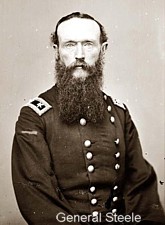 For many months during General Frederick STEELE'S administration in Arkansas, Fort Smith was a den of thieves; and STEELE, though
not implicated himself, was removed because these abuses were not corrected. General THAYER, STEELE'S subordinate, was
doubtless guilty; and yet, backed by Kansas politicians, who had snuffed the breezes of our Capital, he escaped
disgraceful dismissal.
For many months during General Frederick STEELE'S administration in Arkansas, Fort Smith was a den of thieves; and STEELE, though
not implicated himself, was removed because these abuses were not corrected. General THAYER, STEELE'S subordinate, was
doubtless guilty; and yet, backed by Kansas politicians, who had snuffed the breezes of our Capital, he escaped
disgraceful dismissal.
Let it be said to the credit of General EDWARDS that, though he served at Fort Smith from the time the place was first
occupied by our troops, none ever breathed the least breath of suspicion against him. Indeed, it is said (and if true let
it be recorded to the eternal infamy of those concerned) that, because he had complained of these abuses, his life was
threatened, and he dared not, unaccompanied, appear in the streets after dark. At home, he was called "Honest John
EDWARDS," and the sobriquet has been doubly earned.
General EDWARDS, in appearance and in character, is a good type of a Northern gentleman. He is unassuming in his manners,
and brave and chivalrous without being boastful and pretending. He has not a commanding person, and with strangers would
not pass for what he is worth. With one exception, the portrait here published is a correct likeness: the expression of
his countenance is much kinder than the portrait represents. He has blue eyes, a light complexion, and a sanguine
temperament, and is slightly stoop-shouldered. When he walks, he usually drops his head forward, and keeps his face turned
to the ground. He is not a brilliant man, but he is able and honest.
SOURCES:
SCOTT, Robert N., ed. "OPERATIONS IN MO., ARK., KANS., AND IND. T. Chapter X." Official Records: Series 1, Vol. 3, Part 1 Wilson's Creek Campaign.
The War of the Rebellion: A Compilation of the Official Records of the Union and Confederate Armies.
Pp. 412.
STUART, Addison A. Iowa Colonels and Regiments Pp. 343-50
Photographs courtesy of Library of Congress
Transcriptions by Sharon R. Becker, July of 2010

|


